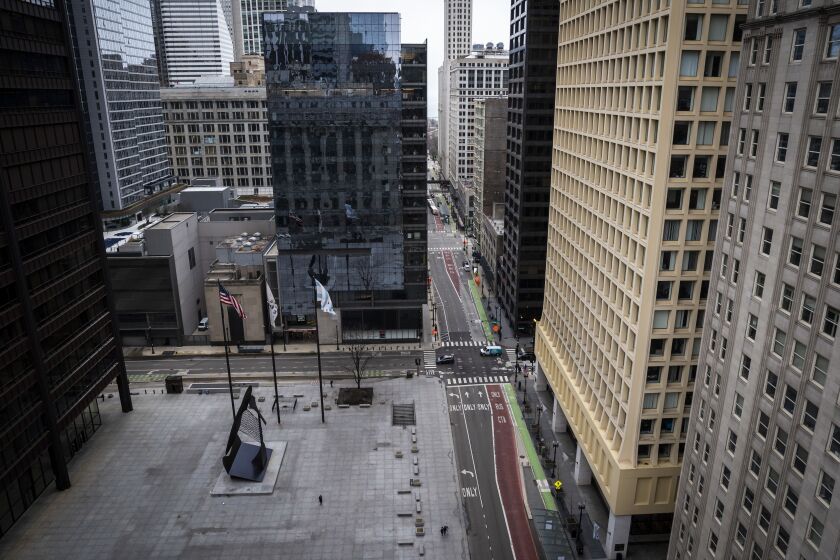The stay-at-home shutdown of the Chicago economy triggered by the coronavirus will cost the city “hundreds of millions” of dollars in revenue and “probably in excess of $500 million,” a top mayoral aide said Monday.
Chief Financial Officer Jennie Huang Bennett offered the first official estimate of Chicago’s budget shortfall under questioning by Ald. Anthony Beale (9th) at Monday’s Finance Committee meeting.
Huang Bennett was testifying about a bare-bones, $100 million capital plan. But Beale wanted an answer to the question that Mayor Lori Lightfoot has so far refused to answer.
How big a hole has the pandemic blown in Lightfoot’s precariously-balanced, $11.6 billion budget? How much revenue will reluctant aldermen have to find — either by cutting the budget or raising taxes?
“We know that it will be several hundreds of millions of dollars. Probably in excess of $500 million,” Huang Bennett said.
“We went into fiscal year `20 with approximately $100 million of excess refunding savings from a [refinancing] completed in January. Thank goodness we did because the market has since become extraordinarily distorted. The state of Illinois just priced some bonds at 5.75 [percent interest rate]. Our bonds overall were priced at a 3 percent level. That gives us some tail winds going into this.”
The long-term cost to Chicago will depend on how long the stay-at-home shutdown lasts, how quickly the local economy bounces back and how much revenue replacement money is earmarked for cities and states in the next wave of stimulus money coming from the federal government.
Top mayoral aides have been running “a number of different scenarios” to project the cost of the coronavirus. They include “shelter-in-place revenue-loss scenarios” that last as long as six months, Huang Bennett said.
“Those numbers are easy to calculate. It’s really the expected time frame for economic recovery which will impact how much this COVID crisis will cost us,” she said.
The city has examined research from economists from the Federal Reserve, the Congressional Budget Office, big banks and Wall Street rating agencies.
But Huang Bennett said: “No one knows exactly what the cost of this is gonna be. … The governor’s Restore Illinois plan and the five phases helps put a framework around it. But we don’t know the exact timing of how we’re gonna come out of this crisis and, ultimately, what that cost will be to the broader economy.”
The $3 trillion stimulus bill Speaker Nancy Pelosi pushed through the House last week includes $1 trillion for cities and states. But that bill faces stiff opposition in the Republican-controlled U.S. Senate.
“That’ll be a huge puzzle piece to how it is that we manage through this. There will be a market reaction to that as well, which will also drive what our costs are,” Huang Bennett said.
Already, the city has received $470 million in federal funding from the original CARES Act.
City Hall is working to determine “how much of that can help us to fund certain corporate fund expenditures that will ultimately help in offsetting some of the expenses we’ve seen related to COVID as well as, potentially, some of the cost of the revenue loss,” Huang Bennett said.
“We know the size of this problem is gonna be large. And it’s something that we’re gonna need all of our resources and tools to be able to address,” the CFO said.
Unlike the state of Illinois, Chicago’s budget is tied to the calendar year.
“At this point, we don’t think that we’re gonna need to come back to City Council to have to re-do anything by way of the budget. But in terms of 2021, there’ll certainly be an extensive amount of discussion as it relates to how we address that gap,” Huang Bennett said.
Earlier this month, Lightfoot told the Sun-Times she was looking at a “range of potential revenue-generating options” to cover declining revenues and rising costs tied to the coronavirus. She argued then that there wasn’t a “city budget across the country” that would be able to avoid “one-time measures” to get “back on track.”
“We’re probably gonna have to look at those as well given the magnitude of the challenge that we’re facing — not only to make sure that we’re steady for 2020, but looking to 2021 and beyond,” she said then.
She described raising property taxes as a last resort, but added: “The reality is that, when you have to have revenue, it’s going to impact someone — and probably someones, plural.”





